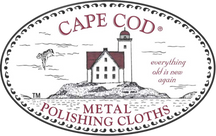Caring for your Brass & Copper
Brass is an alloy of copper and zinc. Two parts of copper are usually used to one part of zinc. Oxidation causes brass and copper to darken and lose its luster. Tarnish on brass and copper can be removed by simply rubbing the item with a Cape Cod® Metal Polishing Cloth and wiping dry with a Cape Cod Buffing Cloth or soft paper towel. Quickly, you will notice a lovely mirror shine and because of its anti-tarnishing feature you won't have to polish as often.
Heavy corrosion on brass or copper should be removed before polishing.
Try a piece of lemon dipped in salt, or hot vinegar and salt, to remove corrosion from brass. This is an old-fashioned method but one that I find useful when dealing with articles that are difficult to clean. Provided they are not decorated with materials that hot water will damage, they can also be boiled in water containing salt and vinegar. Most of the corrosion will be loosened or removed. You can then finish with a Cape Cod® Metal Polishing Cloth to restore the desired shine.
Brass and irons and fire tools that have been long neglected may prove to be a tough job, owing to burned-in resins from your fire. You can use fine steel wool dipped in cooking oil, but it will take plenty of time and elbow grease. Easier to handle and very effective is fine emery cloth of the sort used by metal workers. They are available at hardware stores. Dip the emery cloth in cooking oil and rub in one direction, not round and round, and when it is clean polish it with a Cape Cod® Metal Polishing Cloth.
For antique brass, rub with lemon (mineral) oil and polish softly.
Copper can be given a deep-brown or bronze color by repeated wipings, after thoroughly cleaning, with boiled linseed oil.
